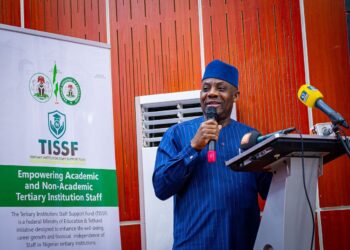The Federal Government has given its approval for the implementation of compulsory drug integrity tests across all tertiary institutions in Nigeria as part of a comprehensive strategy to combat the rising menace of substance abuse among students. The decision was announced following high-level discussions between education and drug enforcement officials in the nation’s capital.
Education Minister Dr. Tunji Alausa confirmed the government’s commitment to this initiative during a strategic meeting with National Drug Law Enforcement Agency (NDLEA) Chairman and Chief Executive Officer, Brigadier General Buba Marwa (retired), held in Abuja on Wednesday. The meeting focused on developing coordinated responses to the escalating drug abuse crisis affecting Nigerian educational institutions.
The new policy framework will require both incoming and returning students at universities, polytechnics, and colleges of education to undergo drug screening tests. Additionally, institutions will be mandated to conduct random drug tests throughout the academic year to ensure ongoing compliance and deterrence. This represents a significant shift in how Nigerian educational institutions will address substance abuse among their student populations.
Dr. Alausa emphasized the urgent need for intervention, highlighting how drug abuse undermines educational outcomes and long-term career prospects for young Nigerians. He explained that substance abuse impairs students’ critical thinking abilities, reduces their capacity for informed decision-making, and ultimately renders them unemployable, creating what he described as a destructive cycle that affects both individuals and society.
The Education Minister stressed that the government had no alternative but to implement these measures, stating that the drug testing policy would initially focus on tertiary institutions before potentially expanding to other educational levels. This approach reflects the government’s recognition that higher education institutions serve as critical intervention points in addressing substance abuse among young adults.
Brigadier General Marwa presented a comprehensive three-part strategy to tackle drug abuse in educational settings. His plan includes revising existing drug education content in schools, introducing dedicated drug prevention programs in secondary schools, and establishing the drug testing protocols for tertiary institutions. The NDLEA chief characterized substance abuse as a significant threat to both national security and youth development.
The drug enforcement agency leader drew connections between substance abuse and serious criminal activities, including terrorism and banditry, arguing that many criminal enterprises would be impossible without the involvement of drugs. He revealed that NDLEA operations over the past two years had resulted in the arrest of more than 40,000 drug offenders and the seizure of over 5,500 metric tonnes of illegal substances.
To support these initiatives, Dr. Alausa announced the establishment of a Substance Use Prevention Unit within the Ministry of Education. This specialized unit will coordinate anti-drug efforts across the education sector and work closely with enforcement agencies to implement prevention programs. The minister also confirmed that work was already underway to revise secondary school curricula to include updated drug education content.
The government plans to create an inter-ministerial technical working group comprising officials from the Education Ministry and NDLEA to oversee the implementation of these policies. This collaborative approach aims to ensure effective coordination between educational and law enforcement agencies in addressing substance abuse challenges.
The curriculum review process will extend beyond secondary schools to include primary education, ensuring that drug prevention education begins at the earliest possible stage. Dr. Alausa indicated that changes to secondary school curricula could be implemented immediately, with primary school adjustments following subsequently.
The Education Minister also pledged government support for ongoing school-based drug prevention programs and promised collaboration with the Universal Basic Education Commission and the Tertiary Education Trust Fund. These partnerships will provide additional resources to support the NDLEA Academy in Jos, Plateau State, which plays a crucial role in training drug enforcement personnel.
This comprehensive approach represents the most significant policy intervention by the Nigerian government in addressing educational sector substance abuse. The mandatory drug testing requirement for tertiary institutions marks a departure from previous voluntary or limited screening programs, signaling the government’s determination to tackle what officials describe as a growing crisis affecting the country’s youth and educational system.




















